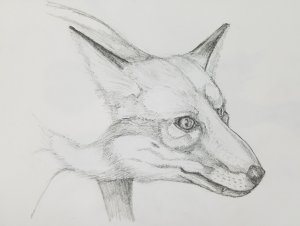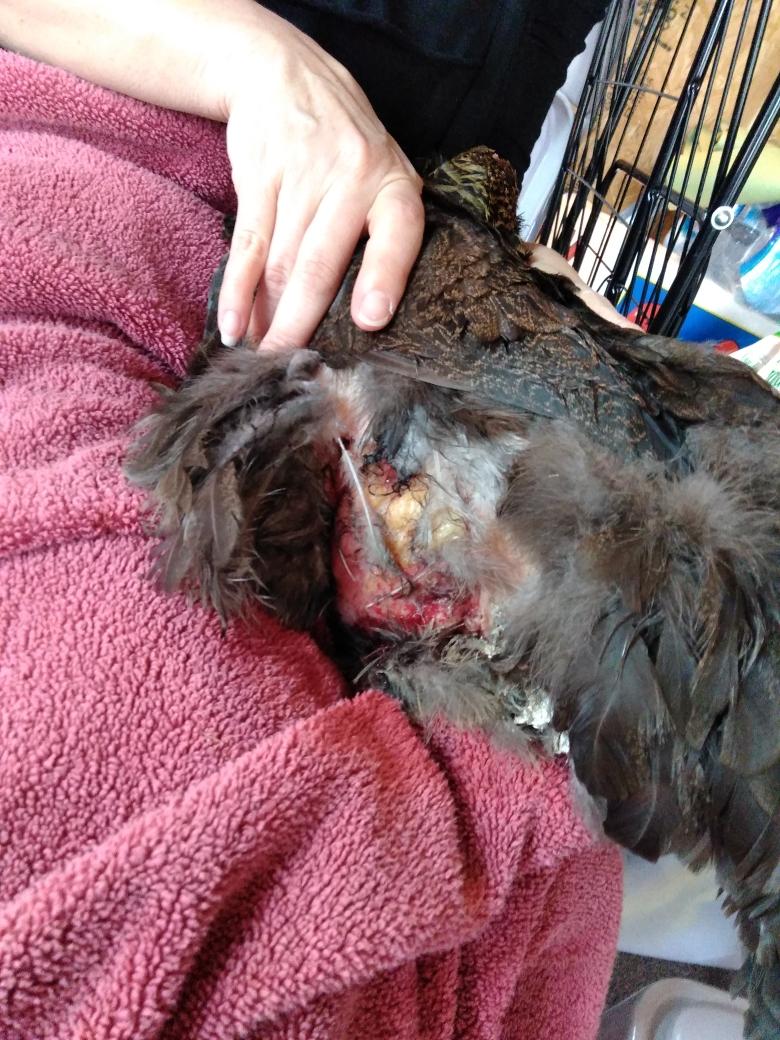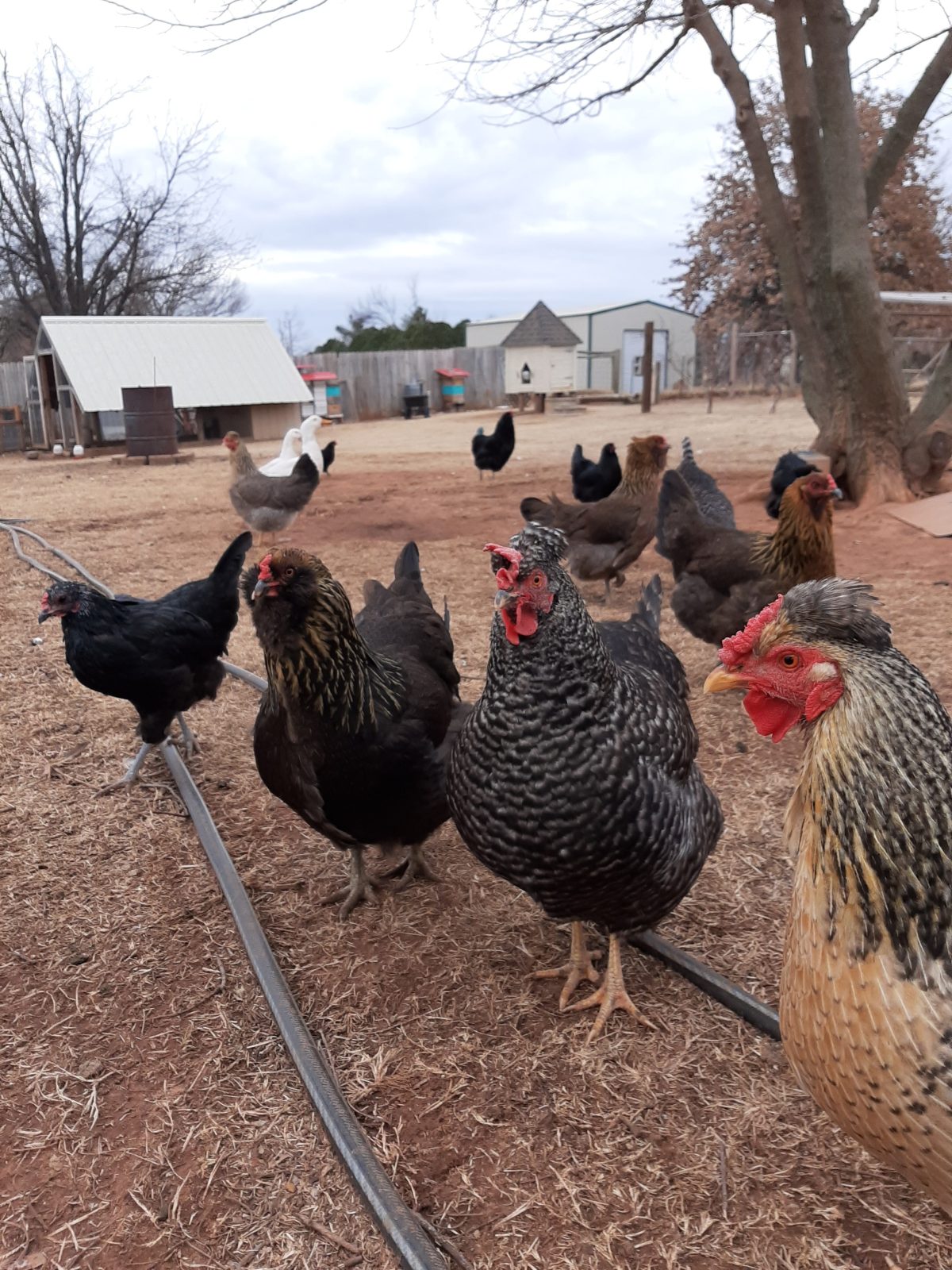In this post, I’m going to go over how to protect your chickens from predators. But first, let’s go over the potential animals of prey.
Predators
If you live in the country, you’re likely to run into a lot of predators. Or rather, they’re more likely to run into you and your chickens, ducks, or rabbits, whatever you have in your pasture or backyard. We have had all three at one time or another.

Foxes
I’ve seen a fox in our neighborhood once, however none have ever gotten our chickens thankfully. Though, I know they can be a menace; in East Texas where my mother-in-law lives on her 40 acres, foxes have routinely taken her chickens to feed their little ones.
Skunks, opossums, raccoons, and coyotes
Skunks, opossums, raccoons, and coyotes are also a threat. Once again we have been very blessed to live in the neighborhood we live in, which is in the country on only one acre in a neighborhood of 1 to 5 acre lots. We have a neighbor who lives a minute or two away (by car) on 5 acres, and they’ve had coyotes. I recall one time a raccoon came to our neighbor’s house next to us in the 7 years we’ve lived here. And he let us know about it, although it never even came into our yard.

Dogs
There are also dogs, which is probably the biggest threat to our flock. Living where we do, dogs are basically allowed to run free. We even know who owns the dogs that run free. One or two of them even look like they’re starving, but there’s no animal control where we live. It’s really sad.
One of our friend’s and good neighbor’s dog attacked and killed one of our roosters (by digging under our fence where the broilers liked to relax) when we were first starting out. He felt so bad about it that he replaced the bird with another rooster. We have had other dogs get in our backyard; there’s a couple of black labs that know how to lift the latch on our gate and they gave our birds a fright a few years ago. However, the birds jumped the fence before anything else happened. We now put a lock on the gate.

Snakes
Snakes are another predator, although they are more of a threat to eggs and chicks than adult chickens. In May 2017 we had a 4-ft long chicken snake in our yard. I noticed, from our picture window in our family room, our bunny jumping up in the distance. It looked like she was either getting stung by bees or getting bitten by a snake. I didn’t know for sure what was going on, so my daughter, Hannah, went outside to check the situation out.
In the meantime, all of the chickens were heading in the same direction, strangely concentrated on one thing. I soon followed my daughter. That’s when we knew it was a snake. At the time we still didn’t know what kind of snake it was. Hannah had it pinned to the ground, my husband was at work, and we were just concerned that there was a snake in the yard. Another neighbor came over and took care of the problem for us. It was then that we calmed down and were able to ascertain that it was a chicken snake.
In September 2019 one of our most favorite and least likely hens went broody, and the two eggs successfully hatched. The chicks were only a couple of days old, so Davis wasn’t leaving or prepared to leave the coop yet. Although, the next morning when I went to let the birds out, I saw Davis in the run. I was aware that the mother wouldn’t leave with her chicks for some time, but again this was new, so I wasn’t really sure what was going on.

My husband was outside, as well, and he asked me if I saw both chicks. I thought I had, but he didn’t. So he looked in the coop and saw a snake, which had gotten one of the new chicks. That’s why Davis and the other chick were out in the run. It was a chicken snake, smaller than the first one that got in our yard. We reasoned that it was able to slip in between the run door and frame-the space was just big enough. Our neighbor closest to the coop used to have a barn cat that was pretty good at keeping critters like that away, though Bobby passed away early 2019. Since that incident we installed more hardware cloth on the door so when it’s closed there’s no longer any space for snakes to sneak in.

Hawks
The following section contains imagery of graphic animal injury.
The other biggest predator threat that our birds face is from the air: Hawks. When we had our first real flock of chickens we had an Ameraucana we called Cody; she liked to forage by herself. This was back when Paul was building the big coop. Well, one day we went running errands, and when we got back Cody was gone. There weren’t any dog tracks-it had rained the day before, so the ground was still muddy. We looked everywhere, looking for tracks. Nothing. We think she got taken by a hawk, but we can never be entirely sure.
On April 20, 2018 Hannah went outside to collect eggs around midday. Strangely all of the chickens were in the run, so she suspected something was wrong. Especially when she saw all of the feathers in the yard. She went to the other side, the coop side, and looked inside and spotted Rex, Cody’s sister and tried to pick her up. That’s when she realized what happened, without knowing the exact details.

Rex had been attacked, most of her tail feathers had been pulled out, and she only had a flap of skin left on her backside. We were left trying to figure out who or what the predator was. Was it a dog? The gates were all closed, and we didn’t think it could be a small dog squeezing through the fence. A cat? Possibly, but we couldn’t imagine it. We thought about a hawk, but hawks don’t let go of their prey, so we easily dismissed that.
We put Rex in a cage with water and food, put some medicine on her wound and then talked to my father-in-law who recommended we get an antibiotic. My oldest daughter’s father-in-law is also a veterinarian and he’s local, so we called him. The next day we picked up some antibiotics for our bird. Over the next 10 days, Rex ended up hating us for her treatment, however she was on the mend with the shot in her rear.

It wasn’t until a couple of days later when we learned the truth of what happened to our bird. Our neighbor across the street was just getting off of work when he saw the hawk dive to attack and pick up one of our hens. But then it unbelievably dropped Rex and flew away. That’s why our bird is still alive today. That and the antibiotics. Consequently she has a reputation and an attitude now. She’s the bird who lived.

Protecting Your Flock from Predators
Now that we’ve gone over the list of predators, let’s discuss ways we can protect our flock from them.
A Good Coop Will Help Protect Your Chickens
So how do you protect your flock from predators? The first and foremost recommendation is to lock your birds up at night once it’s dark. I’ve read of friends who don’t lock up their birds, and sooner or later, predators will get them. With a little training, you can get them to go into the coop. Our birds seem to have an instinct to go in the coop now, so they let themselves in at night. Some, the ones on the lowest end of the totem pole, are the last to go to bed. But as soon as it’s dark, I go out to shut the run door. I bring a flashlight with me to make sure everyone’s in the coop, as I do a head count, double checking that the doors are secure before leaving.
Predator-proof Your Coop To Keep Your Birds Safe
The second most important suggestion is to make sure you have a predator-proof chicken coop and run, since most predators go out at night when the flock goes in. My husband put hardware cloth or wire mesh on the run, which is more sturdy and smaller in diameter than chicken wire. I wrote a post about the types of coops, you can read here.

Get a Chicken-Friendly Dog
Invest in a guard dog for the flock-that’s just what my in-laws did. They were tired of the yearly assaults by foxes so they bought a Great Pyrenees mix. Lights and noises are also supposed to be deterrents, and because of the latter, guinea hens might make good alarms to predators due to the odd sounds they make.
When we had our Shetland Sheepdog, Moses, I truly believe his presence helped discourage aerial attacks. Now we have Sophie, and when she’s outside, I think she does the same. I also believe that if the birds tolerate the dog, and the dog warms to the flock and doesn’t hurt them, then utilize dogs for the benefit of everyone. They are possibly the most beneficial resource we have to dissuade predators from our property; we have only to train them properly.
Since Rex, our hen, got attacked by the hawk, any time our flock hears bird sounds, they run for the coop. They either can’t differentiate between a crow, a Mississippi kite, and a hawk, so they take cover just in case. Or they decide to take cover, because they’d rather be safe than sorry.



Over the years though, we have discovered that the crows and Mississippi kites have nests in the trees surrounding our property. And sometimes when a hawk has flown over screeching, a family of crows or kites will escort the raptor away to keep their own nests and young safe. We’ve witnessed it, although the hawks soon learn and adapt, and stop screeching in order to go undetected. The crows and kites can keep the raptors away, but we can’t depend upon them.
Invest in Shade Trees
The summer months are safer for our birds, because they’re warmer (or hotter, depending upon where you live), so they seek out shade. When we first moved into our house there were only two trees big enough in our backyard where the birds could sit and keep relatively cool. I soon learned they were far safer from predators under those trees in the summer than out walking around in the winter or autumn in full sunlight where they were exposed. In the Spring of 2016 we planted three fruit trees, and every year since, we’ve planted more, either fruit or ornamental.
What Not to Do
It is illegal in the United States to kill hawks or owls, even if they kill or attack our source of food or income. Raptors are protected, but we have to discourage them from coming to our yards. Roosters don’t always fight predators; a lot of people mistakenly think they do. Casanova, our first rooster, fought us over who was going to be the head roo. Megatron, my current rooster, fights actual roosters, to put them in their place (kinda like Casanova, only he was slightly confused). But the rooster is supposed to warn of danger; that’s the main way he protects the flock. There isn’t any way he can take on a dog, skunk, raccoon, or hawk; it would be futile unless the predator was smaller than him.
The best, proven options are a good coop and making sure the birds are inside at night. And during the day, if you have problems with predators, you may have to get a dog suited to chickens. It will deter the predator by always being a presence. You can click here to find out which dogs are best.


10 replies on “How To Protect Your Chickens From Predators”
Good information! We’ve had chickens for about 10 years and been lucky to never have any major predator problems. Then a few weeks ago we go out to find five chickens dead. None had been eaten, just shook to death and killed and left laying. It happened during the day, so we think it must have been a dog, but haven’t seen the first sign of a dog around in the weeks since. Kind of a mystery at this point. We’ve occasionally lost a chicken to a fox, but usually they just take one chicken and go.
LikeLike
Yeah, it sounds like dogs. We’re there any animal prints?
LikeLike
We didn’t think to look before we had already trampled over everything, so we couldn’t find any unfortunately.
LikeLike
That stinks. It’s a common problem where we live unfortunately.
LikeLike
[…] And others will leave behind feathers. At times that might be all you see. In one of my other posts I described how one of our Ameraucana hens was attacked by a hawk. More often the hawk […]
LikeLike
[…] else to consider when designing or buying a coop and run is how to predator proof it. I have had friends that never locked their birds up at night, just letting the chickens fend for […]
LikeLike
[…] you have a backyard flock and have had trouble with the occasional predator, you might want to know the best dog breeds for chickens. There are some that will guard your […]
LikeLike
[…] some of you, I’ve lost birds to predators, freezing weather, heat stress, and obesity. Shoot, I even lost one to a heart attack. But […]
LikeLike
[…] predators […]
LikeLike
[…] some of you, I’ve lost birds to predators, freezing weather, heat stress, and obesity. Shoot, I even lost one to a heart attack. But […]
LikeLike